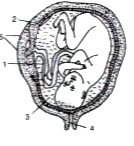What are the functions of placenta other than its endocrine function?
Step-by-Step Solution
1. Definition of Placenta:
- The placenta is a vital organ that forms during pregnancy, serving as the structural and functional unit between the developing embryo (or fetus) and the maternal body (the mother). It plays a crucial role in supporting the growth and development of the embryo.
Hint: Remember that the placenta connects the mother and the embryo, facilitating various functions.
2. Endocrine Function:
- While the question specifically asks for functions other than its endocrine function, it is important to note that the placenta does have significant endocrine functions. It secretes hormones such as human chorionic gonadotropin (HCG) and human placental lactogen (HPL), which are essential for maintaining pregnancy.
Hint: Identify the hormones produced by the placenta to understand its endocrine role.
3. Supply of Oxygen and Nutrients:
- One of the primary functions of the placenta, aside from its endocrine role, is to facilitate the supply of oxygen and essential nutrients to the developing embryo. The placenta absorbs these vital substances from the maternal blood and delivers them to the embryo, ensuring its growth and development.
Hint: Think about how the embryo gets the necessary resources for growth.
4. Removal of Waste Products:
- The placenta also plays a critical role in the removal of carbon dioxide (CO2) and other excretory wastes produced by the fetus. As the fetus metabolizes nutrients, it generates waste that needs to be expelled. The placenta helps in transferring these waste products back to the maternal circulation for elimination.
Hint: Consider the importance of waste removal for the health of the developing fetus.
5. Barrier Function:
- Although not mentioned in the video, another important function of the placenta is to act as a barrier. It protects the fetus from harmful substances and infections, while still allowing the passage of essential nutrients and gases.
Hint: Reflect on how the placenta serves as a protective shield for the fetus.
6. Immunological Role:
- The placenta also has immunological functions, helping to protect the fetus from the mother's immune system, which might otherwise recognize the fetus as a foreign body.
Hint: Think about how the body differentiates between self and non-self during pregnancy.
Summary of Functions of Placenta (Other than Endocrine Functions):
- Supply of oxygen and nutrients to the embryo.
- Removal of carbon dioxide and other excretory wastes from the fetus.
- Acts as a barrier to protect the fetus from harmful substances.
- Provides immunological protection to the fetus.
- The placenta is a vital organ that forms during pregnancy, serving as the structural and functional unit between the developing embryo (or fetus) and the maternal body (the mother). It plays a crucial role in supporting the growth and development of the embryo.
- While the question specifically asks for functions other than its endocrine function, it is important to note that the placenta does have significant endocrine functions. It secretes hormones such as human chorionic gonadotropin (HCG) and human placental lactogen (HPL), which are essential for maintaining pregnancy.
- One of the primary functions of the placenta, aside from its endocrine role, is to facilitate the supply of oxygen and essential nutrients to the developing embryo. The placenta absorbs these vital substances from the maternal blood and delivers them to the embryo, ensuring its growth and development.
- The placenta also plays a critical role in the removal of carbon dioxide (CO2) and other excretory wastes produced by the fetus. As the fetus metabolizes nutrients, it generates waste that needs to be expelled. The placenta helps in transferring these waste products back to the maternal circulation for elimination.
- Although not mentioned in the video, another important function of the placenta is to act as a barrier. It protects the fetus from harmful substances and infections, while still allowing the passage of essential nutrients and gases.
- The placenta also has immunological functions, helping to protect the fetus from the mother's immune system, which might otherwise recognize the fetus as a foreign body.
- Supply of oxygen and nutrients to the embryo.
- Removal of carbon dioxide and other excretory wastes from the fetus.
- Acts as a barrier to protect the fetus from harmful substances.
- Provides immunological protection to the fetus.
Topper's Solved these Questions
- SELF ASSESSMENT PAPER-1BOOK - ICSECHAPTER - SELF ASSESSMENT PAPER-1EXERCISE - Part-II (Section -C)
12 Videos
- SELF ASSESSMENT PAPER-1BOOK - ICSECHAPTER - SELF ASSESSMENT PAPER-1EXERCISE - Part-II (Section -A)
9 Videos
- SELF ASSESSMENT PAPER 9 BOOK - ICSECHAPTER - SELF ASSESSMENT PAPER 9 EXERCISE - SECTION .C.
12 Videos
- SELF ASSESSMENT PAPER-4BOOK - ICSECHAPTER - SELF ASSESSMENT PAPER-4EXERCISE - Part-II (Section C)
7 Videos
Similar Questions
Knowledge Check
What is a placenta?
ACellsBParenchymatous cushionCLayersDOvary
Function of placenta is:-
View SolutionSummarise functions of placenta.
View SolutionWhat are the functions of areolar tissue?
View SolutionWhich is not the function of placenta
View Solution(a) The diagram given below is that of a developing human foetus in the womb. Study the same and then answer the questions that follow :

(i) Name the parts '1' and '5' indicated by guidelines.
(ii) What term is given to the period of development of the foetus in the womb ?
(iii) How many days does the foetus take to be fully developed ?
(iv) Mention two functions of the part labelled 2 other than its endocrine function.
(v) Name the hormone (any one) produce by the part labelled 2
(vi) What is the function of the part marked 3 ?
(b) Give the exact location of amnion.
[ICSE 2011, 2014]
View SolutionState any three functions of placenta in human female.
View SolutionMention any four functions of placenta.
View Solution
